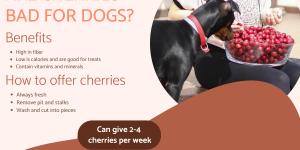Can Dogs Eat Pears?



See files for Dogs
Although fruit can be part of a dog's diet, its consumption should not be abused. For example, pears for dogs may have certain health benefits, but too much can cause them harm. Offering your dog pear requires quality over quantity.
If you’re wondering, can dogs eat pears?, or what other fruits are suitable for dogs to eat, we have you covered. Keep reading AnimalWised to discover more about the fruits and vegetables dogs can and can’t eat and how to safely offer your dog pear.
What fruits can dogs eat?
Many people believe that dogs are strictly carnivorous animals. For this reason, they believe they shouldn’t eat any other type of food other than protein. Partially due to the process of domestication, dogs require a more varied diet in order to stay healthy and happy. What is most important is that their nutritional needs are met.
Fruit is not only recommended for dogs, but they also love it! Additionally, fruit provides dogs with a large amount of vitamins and minerals that are incredibly beneficial to dogs. They can also be used a great healthy treat which the dog will love.
While it is true that the majority of a dog’s diet should consist of food and meat, fruit and vegetables should make up 10-15% of this total. This is why you often see commercial dog kibble made with vegetable ingredients as well as meat-derived protein.
So, if you’re wondering, can dogs eat apples? or can dogs eat bananas?, the answer is yes. Among the many fruits that dogs can eat, we find:
- Apple
- Peach
- Banana
- Pineapple
- Papaya or milky
- Mango
- Strawberry
- Blackberry
- Coconut
- Sweet melon
- Raspberries
- Watermelon
- Orange
- Tangerine
For more, we recommend reading our article where we list recommended fruits and vegetables for dogs.
Now we know can dogs eat pears, we want to know some more information about their nutrition and how to feed pear to your dogs. Also, since there are different types of pears, we will provide a list of the pears dogs can eat.

Can dogs eat all types of pears?
The answer is YES, dogs can eat pears. However, we need to define what a pear is to be clear. When we refer to pears, we are talking about the fruits of the genus of tree known as Pyrus. The fruits of these types of tree are known as pears and none of them are toxic to your dog. In fact, pears are incredibly beneficial for dogs. But, when feeding your dog pear, you need to control its amount. Excess pear can be harmful to dogs due to its high concentration of sugars.
A dog’s ideal diet should be rich in protein and fat. Unlike meat or high quality dog feed, which should be offered daily, fruit for dogs should always be given in small portions and only occasionally (as a treat, for example).
You may wonder if dogs can eat other fruit we know as pears. For example, you may ask can dogs eat cactus pears? These are the fruit on top of the cactus known as the prickly pear. In this case, the answer is know. The fruit on pricky pear cactus are toxic to dogs, especially in large amounts. Also, the spine of the cactus can cause the dog harm, so it is best to stay away from them.
Some of the common types of pears which dogs can eat include:
- Green Anjou
- Red Anjou
- Bartlett
- Red Bartlett
- Bosc
- Conference
- Comice
- Concorde
- Forelle
- Seckel
- Starkrimson
As long as they are eaten as part of a balanced diet, these are all types of pear cultivars dogs can eat.
Pear nutrition for dogs
Like the vast majority of fruits, pears are composed mainly of water, 84% to be exact. In addition, they have around 10 grams of carbohydrates, 1 gram of vegetable protein, 0 grams of fat and 2/3 grams of fiber. All of these beneficial nutritional compounds constitute pears as a great snack for all dogs.
In addition to the above, pears are very rich in vitamins, including:
- Vitamin C
- Niacin (vitamin B3)
- Pyridoxine (vitamin B6)
- Beta-carotene
- Thiamin (vitamin B1)
- Folate (vitamin B9)
- Riboflavin (vitamin B2)
Pears also contain minerals such as:
- Potassium
- Calcium
- Iron
- Iodo
- Sodium
- Magnesium
For more about what to feed a dog, we recommend reading our article where we discover the best natural diet for dogs.
Benefits of pear for dogs
The nutritional value of pears for dogs translates into endless benefits and properties. Some of the most beneficial properties of pears for dogs include:
- Beneficial for the heart: due to the high concentration of fiber, pears help to keep the heart healthy, preventing heart disease. In addition, they help to reduce blood pressure and cholesterol levels.
- Can help prevent cancer: fiber plays an important role in preventing cancer, specifically colon, lung and stomach cancer.
- Protects eyesight: thanks to its high levels of vitamins, pears can help prevent macular degradation linked to aging.
- Maintains stable sugar levels: pears have a low glycemic index which can help control blood glucose levels.
- Healthy Snack: pears are low in calories and rich in nutrients, satisfy your dog’s hunger without affecting its weight.
- They are incredibly hydrating: pears are among the fruits that carry a greater amount of water, so they are a great way in making sure a dog is well hydrated. Offering your dog pear in summer is also a great way in making sure your dog is receiving enough fluid, helping to avoid heatstroke in dogs when doing so.
As well as knowing what fruits to feed your dog, you should also bear in mind which fruits are dangerous or toxic for dogs. For more, we recommend reading our article where we list forbidden fruits and vegetables for dogs.
How to give pear to dogs
Now that you know you can feed your dog with this delicious fruit, we need to take into consideration how to offer it to them. First, you need to make sure that the pear is ripe. If the pear is to hard, do not give it to your dog. Then you will need to make sure you wash it well, removing any dirt or chemical preservatives that may be present on the skin. Finally, you have to make sure to remove all of the seeds. Seeds contain cyanide and are harmful to dogs, so their removal is vital.
Cut and offer your dog pear pieces occasionally, either as a source of hydration during walks or as a treat once or twice a week.
As with other fruits, dogs should only eat pears in small quantities, since the high content of fiber and natural sugars can cause stomach upset and diarrhea in dogs. In addition, the quantity will also vary depending on your dog’s size. As already mentioned, fruit and vegetables should occupy 10-15% of your dog’s total daily diet.
Dogs can eat pears with or without skin, provided they are washed well. Keep in mind that the highest quantity of fiber is concentrated in a pear’s skin, so if you’re offering your dog pear to aid with constipation, we suggest leaving the skin on.
And yes, puppies can also eat pears. If, however, you do notice that the pear is not sitting well with your dog, there is a possibility that it may be intolerant. For more, we suggest reading our article where we discuss food intolerance in dogs.

What fruits can dogs eat?
Dogs can eat virtually any type of fruit, as long as it does not exceed 15% of their daily diet. In addition, we recommend offering your dog fruits which are lower in sugars.
It’s important to note that dogs hate the smell of citrus. Even though citrus can be good for dogs, they will most likely reject it. So, if you’re wondering, ‘‘Can dogs eat oranges?’’ Yes, they can, but they may not want to.
Can dogs eat apples?
Yes! Apples are very beneficial for dogs, especially when trying to treat diarrhea or avoid constipation.
Can dogs eat grapes?
No! Grapes are poisonous for dogs and are therefore one of the few fruits which dogs should never eat.
If you want to read similar articles to Can Dogs Eat Pears?, we recommend you visit our Homemade diets category.






